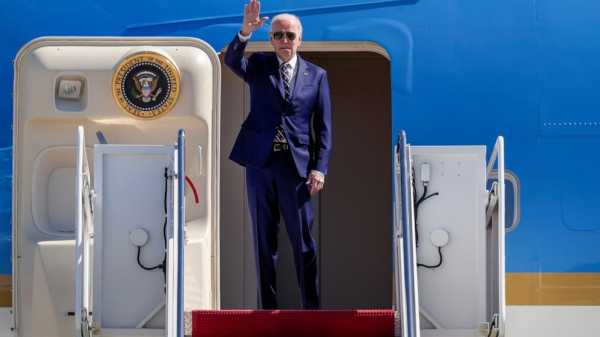
WASHINGTON — With Republicans in control of the House, there's no chance that President Joe Biden's new budget plan will become law as it stands. Instead, the financial blueprint that he announced Thursday in Philadelphia will serve as a political talking point for a president preparing to run for reelection.
“I just laid out the bulk of my budget,” Biden said during a stop at a union training center. “Republicans in Congress should do the same thing. Then we can sit down and see where we disagree.”
Many of the key proposals are designed to draw sharp contrasts with Republicans.
Some of the highlights of Biden's plan:
BIDEN EMPHASIZES FISCAL RESPONSIBILITY
Biden’s budget covers the next 10 years. Overall, he expects an additional $4.7 trillion in tax revenues and $800 billion in savings from making changes to government programs. Biden also wants $2.6 trillion in new spending. That leaves him with an estimated $2.9 trillion reduction in the deficit.
The president emphasized fiscal responsibility as he prepared his budget, portraying Republicans as not being serious about getting the country's finances in order. Republicans have said Biden's plan doesn't go far enough, but they haven't released proposals of their own.
___
MINIMUM TAX ON BILLIONAIRES
Biden frequently talks about making companies and the wealthy “pay their fair share,” and the budget is designed to further that goal.
The president wants a 25% tax on the richest 0.01% of Americans. The White House calls this a “minimum tax on billionaires.” The idea is designed to extract more revenue from income that isn't derived from salaries, ending what the administration describes as “special treatment” and "giant loopholes.”
Biden also wants to roll back tax breaks enacted under his predecessor, former President Donald Trump. For example, people making more than $400,000 a year would once again face a top tax rate of 39.6%.
The budget proposal would also close the “carried interest” loophole that allows wealthy hedge fund managers and others to pay their taxes at a lower rate.
___
MEDICARE FUNDING BOOSTED
A key trust fund that funds Medicare, which provides health care to older adults, is on track to become insolvent in about five years, meaning it would be unable to fully cover the cost of benefits. The White House says Biden's plan would push that date back to the 2050s.
Some of the money would come from expanding the federal government's ability to negotiate the cost of prescription drugs, something that began with the Inflation Reduction Act that Biden signed last year. He also wants to increase the Medicare tax rate from 3.8% to 5% on income exceeding $400,000 per year, including salaries and capital gains.
Biden has frequently targeted Republicans over their proposals to reduce Medicare benefits or force Congress to reauthorize the program. (Social Security is similarly being threatened by Republicans, Biden often says.) So expect to hear more from the White House on how the president's plan would help older Americans.
___
FULLY REFUNDABLE CHILD TAX CREDIT
Congress expanded the child tax credit during the pandemic to help families cope with the economic fallout, but the extra money expired last year.
Now Biden wants to restore the credit to its previous level. The change would provide families up to $3,600 per child, up from $2,000. The credit would be “fully refundable,” which means households could receive all of the money even if they don’t owe any taxes. That approach is designed to make sure the credit benefits low-income families.
___
REDUCTION OF CANCER DEATH RATES
Biden made fighting cancer part of the “unity agenda” that he outlined near the beginning of his administration, and he wants $2.8 billion to advance that goal.
He's described the effort as a “cancer moonshot” that should become a “national purpose” for Americans. It's a personal issue for Biden. His eldest son, Beau, died from a brain tumor. In addition, the president and first lady Jill Biden both recently had lesions removed that contained basal cell carcinoma, a kind of skin cancer.
Biden wants to reduce cancer death rates in half over the next quarter-century.
___
PROMOTING CLEAN ENERGY TO TACKLE CLIMATE CHANGE
Last year’s Inflation Reduction Act provided hundreds of billions of dollars in financial incentives to promote clean energy. Now Biden’s budget proposal would add more to the further the goal of reducing greenhouse gas emissions.
The plan includes $4.5 billion to further clean energy development and $16.5 billion to develop new technologies and conduct scientific research. Biden also wants $7 billion, an increase of about $1 billion, to support economic revitalization and job creation in communities that relied on coal, oil and gas production.
The budget would spend $35 million to begin planning for a new national lab at a historically Black college or university, a tribal college or university, or another minority-serving institution.
___
EYES ON CHINA
Some of the budget is designed to help Biden's effort to steer U.S. foreign policy to confront China's rising influence.
The Pentagon would receive $842 billion, which includes money to modernize the U.S. nuclear arsenal. There's also a proposed 5.2% proposed pay increase for troops, designed to help the military boost its lagging recruitment.
In addition, the budget would allocate $7.1 billion to renew agreements with three Pacific Island nations that the Chinese have been wooing. The amount includes $6.5 billion over 20 years to the Marshall Islands, Micronesia and Palau, plus an additional $634 million to maintain U.S. Postal Service operations there.
Under “Compact of Free Association” agreements with the three, the U.S. provides the islands with an array of services that range from weather forecasting to disaster management, air traffic control and mail delivery.
__
Associated Press writers Josh Boak, Matthew Daly, Tara Copp, Matthew Lee and Darlene Superville contributed to this report.
Sourse: abcnews.go.com






